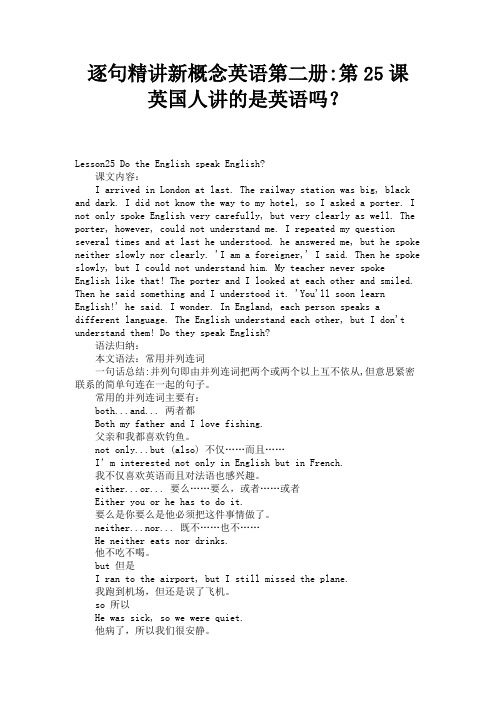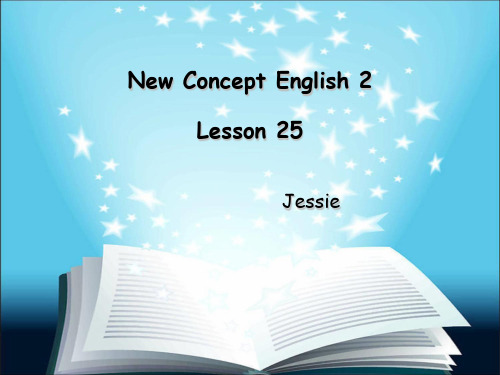裕兴新概念英语第二册笔记-第25课复习课程
- 格式:docx
- 大小:22.22 KB
- 文档页数:5


逐句精讲新概念英语第二册:第25课英国人讲的是英语吗?Lesson25 Do the English speak English?课文内容:I arrived in London at last. The railway station was big, black and dark. I did not know the way to my hotel, so I asked a porter. I not only spoke English very carefully, but very clearly as well. The porter, however, could not understand me. I repeated my question several times and at last he understood. he answered me, but he spoke neither slowly nor clearly. 'I am a foreigner,' I said. Then he spoke slowly, but I could not understand him. My teacher never spoke English like that! The porter and I looked at each other and smiled. Then he said something and I understood it. 'You'll soon learn English!' he said. I wonder. In England, each person speaks a different language. The English understand each other, but I don't understand them! Do they speak English?语法归纳:本文语法:常用并列连词一句话总结:并列句即由并列连词把两个或两个以上互不依从,但意思紧密联系的简单句连在一起的句子。

新概念英语第二册lesson25 Do the English speak English?标题: 在这里均为名词,但意义不同。
第 个指“英国人”,为总称,后面的动词必须用复数第 个指“英语”。
指语言时前面不加冠词,指人则要加 :还可以作形容词,表示“英格兰的”、“英国的”、“英国人的”等;单词:★铁路 路,途径 扶手,栏杆,围栏:火车站 公路 地铁★ 几个可数名词复数 不可数名词可数名词复数 = 一些):一些 即可以修饰可数,又可以修饰不可数… 大量的一段时间 一段时间以前某时 有时 偶尔★ 外国人 蓝眼睛外国人①外国的,海外的外国留学生: 洋货: 外交事务:②陌生的★ 感到奇怪① 对 事情感奇怪② 想要知道③ 对什么感到怀疑你对什么感到疑惑呀?④ … 难怪…奇观世界古代七大奇观极好的练习: 我想知道她什么时候能来。
不知道为什么仓库今天关门了。
我在想你会不会帮我。
’这是个巨大的奇迹。
’课文:大地方 小地方表示到达:强调努力的结果表示一种结局次序上的最后黑暗的( )深的( )忧郁的( )…… … ………… 不仅…而且…他不仅自编剧本,还饰演其中的角色。
这个年轻人不仅聪明,而且很勤奋。
练习: 他不但很聪明,而且很勤奋( )。
他不但吸烟,而且喝酒。
她不但会说 英语,而且会说德语。
这个短语本身的含义是“也”、“又”、“还”:玛丽不仅找到了她姑妈,而且还在她那里住了两星期。
连接整个谓语如果你明天回家,我也回。
他把钢笔借给了我,还有字典。
既不 也不 两者都不(用 … …连接并列主语时,谓语则随最后一个主语的人称和数而变 就近原则)若将 句型变为肯定句,只需把 改为 即可,同时谓语动词必须用复数形式。
练习: 她既不胖也不瘦。
我既没有给他打电话,也没有给他写信。
我既没有钱也没有时间去旅游。
更强调个人或个别, 更强调全体或全部语法:并列句 把两个或几个简单句用并列连词连接起来,则成为一个并列句。
’’’’表示并列关系的并列连词,这类连词主要有 …… … … 等。



新概念英语第二册课后练习题答案详解( 第 25 课) 新概念英语第二册课后习题Lesson 251. ca. The writer didn 符;b. The porter didn’t know any English与课文实际内容不’t speak English也与实际情况不符;d.The writer was a foreigner虽然是课文涉及的内容,但不是作者不能听懂搬运工人讲话的真正原因,因为作者也懂英语; 只有 c. The writer couldn’t understand the porter’s English最符合课文的实际情况,是准确答案。
2. b根据文章 My teacher never spoke English like that!, b. expected everyone in England to speak like his teacher 出了作者的想法 . 只有说a. didn't think the porter was English中没有这样的暗示 .与事实不符合, 文章c.. doesn't think the English speak English,真实想法 .不是作者的d. thinks that the English speak many differentlanguages 虽然作者是这样说的 , 但是不一定是作者的真实想法.3. b只有选 b. is最符合语法。
a. are不合乎语法,因为English 做“英语”讲时是单数名词,不能跟复数的系动词are; c. was也不合乎语法,因为陈述一种语言的性质应该用一般现在时; d. has (有) 更不符合语法,因为has 不能做系动词。
4. a个疑句是次数提的,回答是how many times多少次,是次数的。
several times ,只有 a.其他3 个都不是次数提的。
新概念英语第二册课后练习题答案详解(第25课)新概念英语第二册课后习题Lesson 251. ca. The writer didn’t know any English 与课文实际内容不符;b. The porter didn’t speak English 也与实际情况不符;d. The writer was a foreigner 虽然是课文涉及的内容,但不是作者不能听懂搬运工人讲话的真正原因,因为作者也懂英语;只有c. The writer couldn’t understand the porter’s English 最符合课文的实际情况,是准确答案。
2. b根据文章My teacher never spoke English like that!, 只有b. expected everyone in England to speak like his teacher 说出了作者的想法.a. didn't think the porter was English 与事实不符合,文章中没有这样的暗示.c.. doesn't think the English speak English, 不是作者的真实想法.d. thinks that the English speak many different languages虽然作者是这样说的,但是不一定是作者的真实想法.3. b只有选b. is 最符合语法。
a. are 不合乎语法,因为English 做“英语”讲时是单数名词,不能跟复数的系动词are; c. was 也不合乎语法,因为陈述一种语言的性质应该用一般现在时; d. has (有)更不符合语法,因为has 不能做系动词。
4. a这个疑问句是针对次数提问的,回答是several times ,只有a. how many times 多少次,是问次数的。
其他3个选择都不是对次数提问的。
新概念英语第2册Lesson25~27课文详注新概念英语第2册Lesson25课文详注1.Do the English speak English? (标题)英国人讲的是英语吗? English在这里均为名词,但意义不同。
第1个指“英国人”,为总称,后面的动词必需用复数;第2个指“英语”。
指语言时前面不加冠词,指人则要加the:The English often talk about the weather.英国人常常谈论天气。
Do you speak English?你会讲英语吗?English还可以作形容词,表示“英格兰的”、“英国的”、“英国人的”等:He was English.他是个英国人。
与English相像的单词有French,Chinese,Japanese等:I said good morning to him in French.我用法语向他问早上好。
2.I arrived in London at last. 我最终到了伦敦。
(1)这里London前面不加冠词,介词in暗指London是个大地方。
(2)at last为固定短语,表示“最终”,一般暗指经过一番等待、麻烦(苦恼)或努力之后:It was my turn at last.最终轮到我了。
I repeated my question several times and at last he understood.我把问话重复了许多遍。
他最终听懂了。
3.I did not know the way to my hotel…我不知道去饭店的路该怎么走……my hotel不是指属于我的饭店(或旅馆),而是指我已订了房间或者要去住的饭店。
4.I not only spoke English very carefully, but very clearly as well.我的英语讲得不但特别仔细,而且咬字也特别清晰。
not only…but…as well这组连接词与 not only…but also是同样的意思,都表示“不但……而且……”,not only与 but后面的成分必需对等。
【导语】学习新概念英语并不难啊。
你还在为英语成绩低拖后腿⽽烦恼吗?不要着急,⼩编为⼤家提供了“新概念英语⼆册Lessons 25课后练习答案”。
相信加⼊学习当中的你,很快便不再受英语的困扰!还在等什么?和⼩编⼀起来学习吧! 词汇学习 Word study wonder (1)vt.,vi.感到惊讶,感到诧异: They wondered that there was a modern building in that district.那个地⽅居然有⼀座现代化建筑,他们感到很惊讶。
He wondered at the beauty of the old town.这座古⽼⼩镇的美丽令他惊讶不已。
(2)vt.,vi.(对……)感到疑惑/怀疑,想知道:I wonder/I'm wondering if we've made a mistake.我怀疑我们是否犯了个错误。
I wonder what will happen next.我很想知道下⼀步会发⽣什么事。
Will he come to dinner? I wonder.他会来吃饭吗?我怀疑。
(3)n.奇迹,奇观,奇才;惊奇,惊讶: Jane is a wonder. She never fails in her examinations.简是个奇才。
她从来没有考试不及格过。
She looked at the boss in wonder.她惊讶地看着⽼板。
the seven wonders of the world in ancient times世界古代7⼤奇观 each other 从原则上讲,这个短语指两个⼈"互相": You and I must try to help each other.你我两个⼈必须尽⼒互相帮助。
有时,这个短语也可以⽤来指许多⼈之间"互相": We must all help each other.我们⼤家都必须互相帮助。
更多精品文档 学习-----好资料 Lesson 25 Do the En glish speak En glish? 英国人讲的是英语吗?
Why does the writer not un dersta nd the porter? I arrived in London at last. The railway station was big, black and dark. I did not know the way to my hotel, so I asked a porter. I not only spoke En glish very carefully, but very clearly as well. The porter, however, could not understand me. I repeated my question several times and at last he un derstood. he an swered me, but he spoke n either slowly nor clearly. 'I am a foreig ner,T said. The n he spoke slowly, but I could not un dersta nd him. My teacher n ever spoke En glish like that! The porter and I looked at each other and smiled. Then he said someth ing and I un derstood it. 'You'll soon lear n En glish!' he said. I won der. I n En gla nd, each pers on speaks a differe nt Ian guage. The En glish un dersta nd each other, but I don't un dersta nd them! Do they speak En glish?
参考译文 我终于到了伦敦。火车站很大,又黑又暗。我不知道去饭店的路该怎么走,于是向一个搬运工打听。我的英语 讲得不但非常认真,而且咬字也非常清楚。然而搬运工却不明白我的话。我把问话重复了很多遍。他终于听懂 了。他回答了,但他讲得既不慢也不清楚。“我是个外国人,”我说。于是他说得慢了,可我还是听不懂。我的 老师从来不那样讲英语!我和搬运工相视一笑。接着,他说了点什么,这回我听懂了。“您会很快学会英语 的! ”他说。我感到奇怪。在英国,人们各自说着一种不同的语言。英国人之间相互听得懂,可我却不懂他们的 话!他们说的是英语吗? 【New words and expressions 】(5)
1 railway ['reilwei] n. 铁路
2 porter ['p ?:t ?] n.搬运工
3 several ['sev ?r?l]几个
4 foreigner['f ?rin ?] n.外国人
5 wonder ['w ?nd ?] v.感到奇怪
一•单词讲解:— railway n.铁路,铁道[U] (Br.) / railroad (Am.) a line of railway 一条铁路
railway stati on 火车站
railway n. 轨道(pl.) [C] eg. The railway was ope ned to traffic last year. 这条铁路是去年通车的。
high level railway 高架铁路
表示地铁”的词汇:
subway ['s ?bwei] (Am.) tube [tju:b] (Br.) un dergro und (Br.) 学习 好资料 更多精品文档 metro ['metr ?u] (Paris) 地铁 rail n. 横杆,扶手,围栏,轨道 jump rail 出轨 stair rails 楼梯扶手 ride the rails 逃票乘火车 sit on the rails (Am.) 骑墙,保持中立
railing n. 栏杆 iron-bar railing 铁栏杆 porter n. 搬运工,脚夫(在车站,机场,旅馆等处的) bellboy / pageboy (Am.) 旅馆,俱乐部
等通常穿制服的男服务员 port n. 港,口岸 clear a port 出港 close a port 封港 reach a port / enter a port 入港
eg. Many ships frequent the port. 许多船只常来此港。
eg. Any port in a storm. 慌不择路,穷途之策。 (谚)
several 1) more than three but fewer than many 一些,几个
eg. Several more people than usual came to the concert.
来音乐会的人比平常多了几个。 eg. I repeated my questions several times. 我把问题重复了几遍。
2) 各自的,各个的(文)
eg. Several men, several minds. 人各有志; 10 个人有 10 个样。(谚)
foreigner n. 外国人
a blue-eyed foreigner 一个蓝眼睛的外国人 entertain foreigners 款待外宾 entertain [,ent ?'tein] vt. & vi. 款待 , 招待 foreign ['f ?rin] adj. 外国的,无关的,陌生的 foreign language foreign goods 外国货 foreign students 留学生 foreign affairs 外交事务
foreign policy 外交政策 foreign trade 外贸
eg. The question is foreign to the matter in hand.
eg. The subject is foreign to us. 我们对这个问题很陌生。
overseas / oversea adj. 在海外的,来自海外的,侨居海外的 overseas trade 海外贸易 adv. 在海外,来自海外 go overseas 到海
外去, adj. + er n. stra nge stra nger foreig n foreig ner wonder n./v. 1) n. 奇迹
the seven wonders of the world 世界七大奇迹
eg. What a wonder. 真奇妙!
eg. It is a wonder that he survived the plane crash. 他在空难中幸存下来,真是个奇迹。
and no wonder / and little wonder (用来强调前面的句子)不足为奇,难怪 eg. He declined our offer, and no wonder. 难怪他拒绝了我们的给予。
decline [di'klain] vt. & vi. 辞谢; 谢绝(邀请等 )
a nine-day wonder 一时的轰动
这问题与处理中的事情无关。 学习 好资料 更多精品文档 No wonder that … / It is no wonder that 难怪••…
eg. No wonder you were late! 难怪你来晚了。
2) v. 感到惊奇、惊讶
wonder at sth 对某事感到惊奇
eg. We wonder at the speed of modern trains. 我们对现代火车的速度感到惊奇。
接宾语从句: eg. I wonder that you weren 't kill真奇怪,你居然没有被杀死。
3. v. 对某事感到好奇,想知道 ask oneself questions eg. I wonder who he is. 我真想知道他是谁。
eg. I wonder whether you can lend me £ 20.我想知道你是否能借给我 20英镑。
wonderful adj. 令人惊奇的,绝妙的,神奇的(口)
eg. She is a wonderful mother. 她是位伟大的母亲。
eg. She is a wonderful wife. 她是位极出色的妻子。 eg. The weather is wonderful. 天气棒极了。
eg. The teacher is wonderful. 这位老师非常好。 eg. The enthusiasm to study English is wonderful. 这种学习英语的热情是极棒的。
enthusiasm [in' 0 ju:zi??m] n.热情,热心;巨大兴趣,热衷的事物